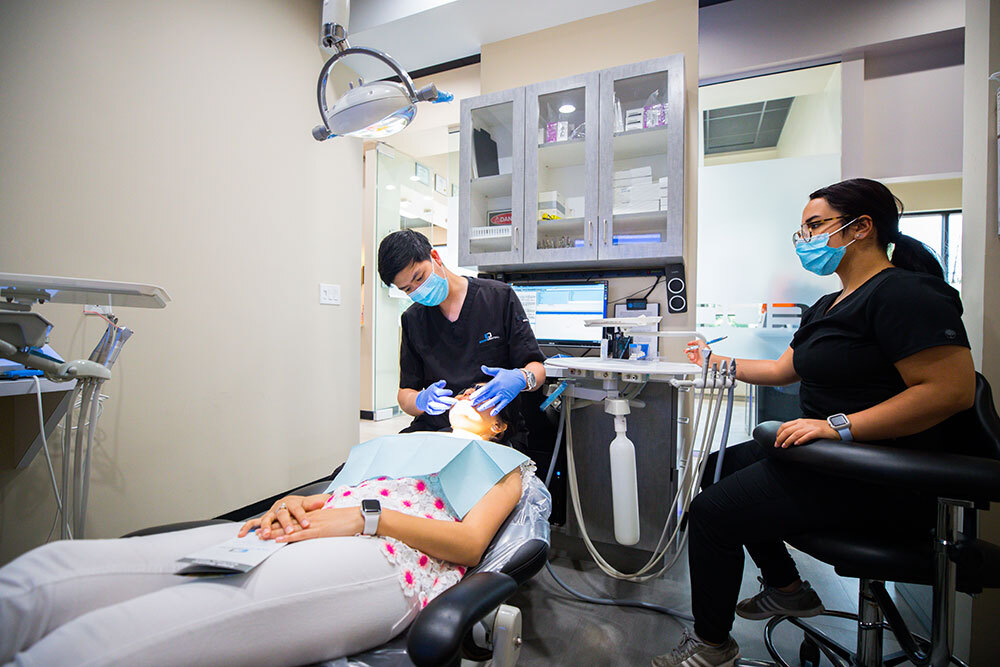What Are Impacted Wisdom Teeth and Why Do They Require Removal?
Impacted wisdom teeth are third molars that fail to emerge properly through the gum line. They often become stuck or “impacted” due to a lack of space in the jaw or an incorrect angle of eruption. This condition can lead to various oral health issues, such as pain, infection, and damage to adjacent teeth.
When wisdom teeth remain impacted, they can create pockets where bacteria thrive, increasing the risk of cavities and gum disease. Additionally, impacted wisdom teeth can exert pressure on neighboring teeth, potentially causing crowding or misalignment. To address these concerns, dentists often recommend removing impacted wisdom teeth to prevent complications and preserve overall oral health.
How Is the Impacted Wisdom Teeth Removal Procedure Performed?
Removing impacted wisdom teeth typically involves a surgical procedure performed by a dentist or oral surgeon. Before the surgery, the dentist will conduct a thorough examination, including X-rays, to assess the position and condition of the impacted teeth. The procedure is usually done under local anesthesia, sedation, or general anesthesia, depending on the complexity of the case and the patient’s preference.
During the procedure, the dentist makes an incision in the gum tissue to expose the impacted tooth. If the tooth is partially erupted, it may be sectioned into smaller pieces for easier removal. Once the tooth is extracted, the dentist cleans the site, stitches the incision (if necessary), and places gauze to control bleeding. Patients are typically given post-operative care instructions to ensure proper healing and minimize discomfort.
What Are the Symptoms Indicating the Need for Wisdom Teeth Removal?
While not all wisdom teeth require removal, certain symptoms can indicate the need for extraction. Common signs include:
- Pain or Discomfort: Persistent pain in the back of the mouth can signal impacted wisdom teeth.
- Swelling or Redness: Inflammation around the gums near the wisdom teeth.
- Difficulty Opening the Mouth: Limited jaw mobility can result from impacted teeth.
- Bad Breath or Unpleasant Taste: Bacterial buildup around impacted teeth can cause odor.
- Recurrent Infections: Frequent gum infections near the wisdom teeth area.
If you experience any of these symptoms, consult your dentist for a professional evaluation.
How Does the Dental Implant Procedure Work?
The dental implant procedure is a long-term solution for replacing missing teeth. It involves inserting a titanium post into the jawbone, which acts as a sturdy foundation for an artificial tooth. The process is typically completed in multiple stages over several months to ensure optimal results.
Step 1: Consultation and Planning
Before the procedure, the dentist or oral surgeon conducts a comprehensive evaluation, including X-rays and 3D imaging, to determine the ideal implant placement. This stage also involves discussing the patient’s medical history and setting realistic expectations for the outcome.
Step 2: Implant Placement
The first surgical step involves placing the titanium implant into the jawbone. The dentist makes an incision in the gum, drills a small hole in the bone, and securely inserts the implant. The gum is then stitched closed, and the implant is left to integrate with the bone through a process called osseointegration, which takes several weeks to months.
Step 3: Abutment Placement
Once the implant has fused with the jawbone, an abutment is attached to the implant. The abutment serves as a connector between the implant and the artificial tooth. This step may require a minor surgical procedure to expose the implant.
Step 4: Crown Placement
Finally, a custom-made crown is secured onto the abutment. The crown is designed to match the shape, size, and color of the natural teeth, providing a seamless and functional replacement.
Can Impacted Wisdom Teeth Affect Dental Implant Success?
Impacted wisdom teeth can potentially influence the success of dental implants if they are not addressed beforehand. Retained wisdom teeth may cause crowding or infection, which can compromise the stability of the implant. For this reason, many dentists recommend removing impacted wisdom teeth before proceeding with dental implant placement.
Additionally, the presence of impacted wisdom teeth can make oral hygiene more challenging, increasing the risk of infection around the implant site. To ensure the success of a dental implant procedure, it is essential to maintain a healthy oral environment free from potential complications.
What Are the Benefits of Combining Wisdom Teeth Removal with Dental Implants?
Addressing impacted wisdom teeth and replacing missing teeth with dental implants can provide numerous benefits, including:
- Improved Oral Health: Removing impacted wisdom teeth reduces the risk of infection, while dental implants restore functionality and aesthetics.
- Enhanced Comfort: Eliminating wisdom tooth pain and securing stable implants can improve overall oral comfort.
- Long-Term Results: Dental implants offer a durable solution, often lasting a lifetime with proper care.
- Preservation of Jawbone: Implants stimulate the jawbone, preventing bone loss that occurs with missing teeth.
By addressing both issues, patients can achieve a healthier, more functional, and aesthetically pleasing smile.
How to Prepare for Wisdom Teeth Removal and Dental Implants?
Proper preparation can contribute to the success of both procedures. Here are some tips:
- Consult with Your Dentist: Discuss your medical history, medications, and any concerns with your dentist.
- Follow Pre-Operative Instructions: Adhere to guidelines regarding fasting, medications, and oral hygiene.
- Arrange for Assistance: Ensure someone is available to drive you home and help during recovery.
- Plan for Recovery: Stock up on soft foods, ice packs, and prescribed medications to manage post-operative discomfort.
What to Expect During Recovery?
Recovery times for wisdom teeth removal and dental implants vary based on the individual and the complexity of the procedures. Generally:
- Wisdom Teeth Removal: Swelling and discomfort typically subside within a week. Patients should avoid strenuous activities and follow a soft diet.
- Dental Implants: Healing from implant placement can take several weeks. Good oral hygiene and regular dental check-ups are crucial during this period.
Following your dentist’s post-operative care instructions is essential to ensure a smooth recovery and successful outcomes.
Are There Risks Associated with These Procedures?
While wisdom teeth removal and dental implants are generally safe, potential risks include:
- Wisdom Teeth Removal: Infection, dry socket, and nerve damage.
- Dental Implants: Implant failure, infection, and nerve or sinus issues.
Choosing an experienced dentist and following post-operative care guidelines can significantly minimize these risks.
Why Should You Consult a Specialist?
Consulting a specialist, such as an oral surgeon or periodontist, ensures you receive expert care tailored to your specific needs. Specialists have the training and experience to handle complex cases, enhancing the likelihood of successful outcomes for both wisdom teeth removal and dental implants.
By addressing impacted wisdom teeth and opting for dental implants when necessary, you can achieve optimal oral health and functionality. These procedures, when performed by skilled professionals, can transform your smile and improve your quality of life.










Post Comment